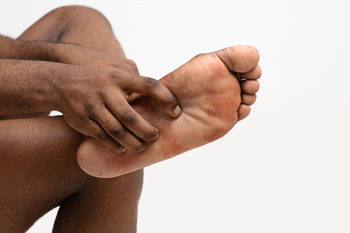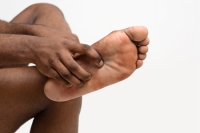
Pain on the bottom of the foot, particularly in the heel area, may be caused by plantar fasciosis, a condition often mistaken for plantar fasciitis. Unlike the latter, plantar fasciosis is characterized by repetitive stress on the plantar fascia rather than inflammation. Plantar fasciosis can develop due to a sedentary lifestyle, wearing high-heeled shoes, or having abnormal foot arches. Tight calf muscles or Achilles tendons also may contribute, and for that reason plantar fasciosis is common among runners, dancers, and anyone with poor foot posture. A sudden increase in activity or a shift to wearing less supportive footwear such as sandals, are other causes. The main symptom of plantar fasciosis is intense heel pain, particularly when first bearing weight in the morning or after periods of rest. A proper diagnosis involves a thorough examination of the foot and may include imaging tests. Understanding the difference between plantar fasciosis and plantar fasciitis is key to effective management of this type of pain. If you are grappling with persistent heel pain, it is suggested that you schedule an appointment with a podiatrist for a diagnosis and the appropriate treatment options.
Many people suffer from bouts of heel pain. For more information, contact Dr. Kenneth Donovan of Advanced Care Foot and Ankle. Our doctor can provide the care you need to keep you pain-free and on your feet.
Causes of Heel Pain
Heel pain is often associated with plantar fasciitis. The plantar fascia is a band of tissues that extends along the bottom of the foot. A rip or tear in this ligament can cause inflammation of the tissue.
Achilles tendonitis is another cause of heel pain. Inflammation of the Achilles tendon will cause pain from fractures and muscle tearing. Lack of flexibility is also another symptom.
Heel spurs are another cause of pain. When the tissues of the plantar fascia undergo a great deal of stress, it can lead to ligament separation from the heel bone, causing heel spurs.
Why Might Heel Pain Occur?
- Wearing ill-fitting shoes
- Wearing non-supportive shoes
- Weight change
- Excessive running
Treatments
Heel pain should be treated as soon as possible for immediate results. Keeping your feet in a stress-free environment will help. If you suffer from Achilles tendonitis or plantar fasciitis, applying ice will reduce the swelling. Stretching before an exercise like running will help the muscles. Using all these tips will help make heel pain a condition of the past.
If you have any questions please contact one of our offices located in Warren, Livingston, and Toms River, NJ . We offer the newest diagnostic and treatment technologies for all your foot and ankle needs.

